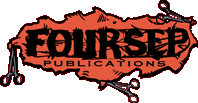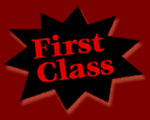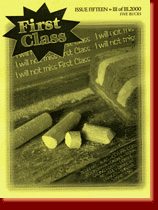


THE SAINTS' CHAMBERMAID
by Rani Burd
We all listened to the tinkling of her stream,
how it opposed the thundering rush of our own torrents.
We thought about this beneath brown robes
and kept our hands clasped.
She cooked sensual dishes for us, chili,
and a bread stuffed with wild mushrooms she'd gathered,
a meal best eaten with fingers.
She learned we liked for her to taste
as she went, an act both maternal and sexual.
The sight of her making our narrow beds humbled us,
her oblivious ample rump bent as she smoothed far corners.
A blond braid dangled down her back.
Did she delight in the knowledge of our eavesdropping and spying?
Something in her was both private and revealing;
thus, we sometimes despised her, and always desired her.
She challenged us -- without dramatizing -- and
gauged our reactions with accuracy. Outrageous!
That is in part why we resented her. Maybe wholly.
But still, wasn't she good, wasn't she?
So brave and strange, this seer
with her benign featherduster.
We, her penance, offered her up to God:
our chaste thrill.
CONTAGIOUS
by Benjamin Newell
The black birds swooped down to the grassy surface in battalions, massive sheets of ebony diving to the turf dispersing like troops blanketing enemy territory, all of them looking for crumbs dropped by generous patrons, thoughtful citizens strolling through the park on a cloudy Sunday afternoon, some of them with the sole purpose of feeding the creatures, others as an afterthought, something to keep them occupied, the hands busy, like a smoker who's addiction to nicotine plays a secondary role to the physical movements of the process, the touching, flicking of the lighter, striking of the match -- the hand moving from mouth, then down to rest on a thigh or table.
An erect figure sitting on a bench, his black trench coat buttoned up, hands clasped around a spread newspaper, eyes peering at the print with the concentration of a surgeon manipulating a tumor embedded in brain tissue, staring at it, studying the malignant mass with a delicate balance of respect and disdain, desperately desiring a successful extraction, yet careful, ever so careful, not wanting to underestimate the cancerous lump.
Or, so it seemed, at least, to anyone walking by, that the man was engrossed in the article before him, scrutinizing the lines like a mindless robot, an editing machine designed for one specific purpose, all the humans with their susceptibility to error eradicated long ago, a black cog in a futuristic, machinated publishing house.
But the man hadn't come to the park to read. Not the article before him. He'd read it at least a thousand times, studied it, memorized every word. It was just something to look at until the time was right.
And as the birds pecked around the field, a tier of about ten meandering close to the man's feet, their beaks rapidly falling and rising, a collaborative frenzied jerk for grounded morsels, the man calmly closed his paper and placed it on the unoccupied plank at his side.
Then he picked up one of the birds, no effort whatsoever of deception or coercion, the act so natural, the bird cooperating wholeheartedly, without the slightest struggle, that it looked like he was picking up a dropped coin or a peculiar rock that caught his eye. And looking at the bird's head, sizing up the feathered knob for a brief second, he shoved it into his mouth, pushing it all the way in, his cheeks bulging like a kid blowing out candles on a birthday cake, and chewed, a feather snaking its way out, hovering in the air, swaying gently like an empty hammock on a breezy day. He chewed and chewed until his mouth's contents were pulverized into a mushy consistency, then swallowed with one massive gulp, the meal working it's way to his stomach as he picked up the paper, rolled it up, and walked away, slowly, whistling, the tune bringing a slight smile to his face just before the floating feather made contact with the grass.
*
The first thing he noticed upon entering the men's restroom in the atrium of The First Savings Bank was the strong, bordering on overwhelming, scent of pine cleaner, the interior walls of his nostrils burning from the chemical induced stimulation. He stood above the sink, studying his face as he turned the cold lever toward his abdomen, a stream of water flowing from the spigot, smashing into the enamel basin with the force of a waterfall, a force much too great for the purpose of cleaning hands. It seemed as if the pressure had been altered for some other purpose, something requiring more power, a greater cutting ability, the cleaning of some industrial machine perhap
As he reached for the fresh, unblemished bar of soap, the door swung open and two men entered, both of them dressed professionally, conservatively, black suits, black tie, white, heavily starched shirts, black wingtips shined to a glimmering sheen that radiated from the bright lights affixed to the ceiling. They didn't acknowledge the man's presence, or, if they did, there was no outward indication, no sign of recognition as they both stood, side by side, each of them claiming a wall urinal as they stared at the sparkling, white tiled wall.
"So, where do you want to eat today?"
"Oh, I don't know," one of the men said, slightly exasperated, as if the effort of such a decision required too much energy, or perhaps that, the question itself, its repetitive hold on his life, the dealing with it everyday was becoming too tiresome, annoying. "Let's just go to Tony's. I don't feel like waiting for a table today."
"Tony's is fine."
He stood at the sink, frozen, a petrified statue, as if the slightest movement would result in detection, the discovery bringing harm to himself.
But when they finished, the pair swiveling around like synchronized dancers in a Broadway show, there was no dash to the sink, none whatsoever, as if the thought to wash their hands hadn't occurred to them. In fact, so deliberate, so swift and sure was their path to the door, the man imagined the two had never established a connection between the two acts.
Then he listened to the clicking of their heels on the corridor floor, a rhythmic click-click-click that faded to silence.
He peered down at the smooth, ivory bar--unused, unmolested by the hands of others. And ever so slowly, as if he were an unfortunate member of the terminally ill reaching for the cure, the last vial of life-saving elixir left on the planet, he retrieved the soap and raised it to his mouth, cramming it in with the same force he employed with the bird, but there was no escapee this time, not even a microscopic sliver of pulp avoided the interior of his mouth. He chewed furiously, smacking, savoring the snack with a greediness, an abandonment bordering on maniacal.
And when it was done, all the goodness devoured, he quietly walked out of the room, whistling again, the same tune, an ingrained ritual to him no doubt, like the neurotic who places his shoes perfectly together at the edge of the bed before retiring for the evening
*
Beatrice Parker sat on the divan, her legs crossed, two, slender crochet needles in her hands. She worked the sticks with such mastery, her eyes, concentrating on the TV, rarely peered down at the nearly completed oven mitt in her lap. Anyone watching her, observing the movements of her fingers, the manipulation of the sticks, would’ve guessed she'd been crocheting her whole life, from the womb, a freak of nature born with the implements, an extra, deformed finger on each hand.
"It's almost done Gina," Miss Parker said.
Gina walked down the three steps leading to the sunken living room and sat next to her mother. She was a slender seventeen year old, slightly homely, with long, red hair that she pulled back in a ponytail. She wore nothing but dresses, long, flowing sun dresses that her mother made for her. She'd never been on a date because her mother forbid her to do so. Once, on her fifteenth birthday, she tried to persuade her mother to teach her to drive, but much like dating, Miss Parker quickly shot the idea down, telling her only daughter that driving was dangerous, that there were too many maniacs out there, and it wasn't worth it. She rarely drove herself limiting her trips behind the wheel to her weekly trek to the supermarket, and an occasional excursion to the liquor store for a fifth of bourbon. She didn't need to work, no, not Miss Parker, not since the tabloid people got word of her eating habits, all of them, a crew with their cameras, pulling into her driveway, an army flooding out of a white van, knocking on her door, asking questions, snapping photos, snooping for a story.
And she gave them one, with stipulations of course, two actually, the first being that she be paid a monthly check, nothing extravagant, she'd never been one for extravagance, but enough for her daughter and herself to live comfortably. The second being this -- that a story, or progress report actually, be featured in the tabloid, a monthly article devoted solely to Miss Parker's eating status, the crux of each journalistic piece being how close she was to reaching her goal.
Her neighbors, for obvious reasons, had long since pegged her an eccentric, the freak of the block, and avoided her, not out of any fear or hatred, but more from an uneasiness, a reluctance to engage her, for what would they say? What does anyone say to a lady who makes her living eating handmade oven mitts?
"It's beautiful," Gina said, smiling at her mother who continued to watch the six o'clock report.
"You like it?"
"Oh yes, very much. I think it's the prettiest one you've ever made."
Miss Parker turned to her daughter. "Gina," she said. "Do you want it?"
"No mother I couldn't. You're so close."
"There's no rush. You can have it if you want it. If you really want it."
Gina stared at her mother, a mixture of fear and uncertainty dancing in her head.
"Do you mean?"
"Most certainly," Miss Parker said, nodding her head. "If you think you're ready."
The girl looked down at her lap, silenced, wishing the question hadn't been asked, desperately desiring her previous state of comfort, the ease of life she'd grown accustomed to.
"If you have to think about it that hard, then you're not ready," Miss Parker said. "Maybe some other time. Maybe never. That's OK too you know. I just want you to be happy."
Gina said, "I'm sorry.
*
"What a fat ass."
"Dude, if I was that fat I'd kill myself."
"Just look at him. He's a fucking slob."
"Damn Jeff, check this one out."
"Wow."
"Look at that ass."
"I'm in love."
Sitting side by side on stools behind the two-way mirrors, Jeff and Phil satisfied their voyeuristic appetites legally. They saw it all and got paid for it. It was empowering, made them feel somewhat elite, chosen, appointed, to watch people, people who didn't know they were being watched, or if they did, couldn't do a damn thing about it. It could get boring, but for the most part they enjoyed their work, the hours of sitting, two friends together in a cramped cubicle, the two of them staring through the glass, observing the shoppers, most of them scrutinizing each item, holding it, feeling it, caressing it, sometimes smelling it...the crazy things humans do while trying to pick out a sweater or belt.
Jeff sat still, watching a mother and her two young sons, the youngsters wrestling on the carpeted floor, not the least bit interested in mother's plea, two shirts in her hand, school clothes for the upcoming year. He remembered it, how it was, just like the show before him, but now he was out of school, now he sat behind glass eight hours a day for six dollars and fifty cents an hour. Christmas aside, his mother hadn't bought him a shirt in over eight years.
But he couldn't dwell too much on that, no need in getting depressed on the job. There was really only one thing that kept them going -- shoplifters. They lived for them, yearned for the few and far between deviant patrons who waltzed into view, examining merchandise, acting normal, disinterested, they watched them stroll through the aisles, around the displays, they watched and watched, all the time itching for an attempt, slipping a pair of socks into the purse, a three pack of t-shirts under the shirt, secured between the abdomen and belt, they'd seen it all, no doubt about it, and they wanted to see more. It's a long wait, an excruciating interval of nothing, sometimes lasting for days, weeks even, but when it happens, when the offense occurs, it's well worth it, all the boring hours blasted to dust.
"Jeff, check out that guy."
Phil had seen the guy walk in, his steps slow, his path unfocused, as if he didn't know what he wanted, where he was going, a wanderer maybe, some sap just killing time while his wife shopped in another area of the store, or maybe, just maybe, he was going to make their night. "The dude in the overalls."
"Yeah."
"Ah, man," Jeff said. "I don't think so."
"I don't know man. I'm getting that feeling."
They watched the man as he stood at the wallet kiosk, turning shelves, picking up a leather square here and there, smelling it, running his fingers across the smooth surface, his head down all the time, never a check for other shoppers or salespeople.
"He don't look shifty to me," Jeff said.
"Maybe not."
Then, just as the two began to divert their attention elsewhere, the man shoved an eel skin money clip into his mouth and started chewing.
"Holy shit man," Jeff said. "Did you see that?"
"What?"
"That dude's eating a money clip."
"Bullshit."
"No man, look. He's munching down on the damn thing. Shit, look at him. Look."
"Well I'll be a son of a bitch."
As soon as he'd tossed it into his mouth and began pulverizing it with his teeth, it was gone, safely eradicated, all evidence of anything tunneling to his stomach.
"I don't guess there's anything we can do about that," Phil said.
Jeff said, "That nut ate a money clip.
*
Dr. Carson and his wife stood patiently in line at a convenience store somewhere in Destin, Florida. It was close to the condo they were renting, the one they claimed for two weeks every Summer.
The gastroenterologist held a six pack of Budweiser while his wife, the lovely Rebecca Carson, exasperated with boredom and impatience, thumbed through a copy of The National Examiner Gazette, a paper she regularly read at home, much to the dismay of her husband.
"Look honey," Rebecca said, pointing to an article. "It says here that that Parker lady is causing all kinds of trouble around the country. Says several cases have been reported of people trying to eat all sorts of things -- Samuel Newcomb, 33, of Nashville, had to be rushed to the emergency room after trying to consume a golf ball. How horrible. Isn't that just terrible honey?"
Dr. Carson turned around and looked at his wife.
He said, "My God, Rebecca. You don't actually believe that rag do you?"
WOMEN WHO LOST THEIR FARM
KILL THEMSELVES
by Robert Cooperman
Never trust a banker's handshake,
a scythe's hidden up his arm.
No matter how many chickens
or eggs we crated to market,
we could never make a dent
in the principal on the loan
he smiled to extend to us.
For the last two years
we made do without electricity,
stored vegetables in the root cellar,
hauled water that tasted
of the alkali that killed
emigrants on the Oregon Trail.
Finally, with the marshals driving
out to throw us off
like Okies in Dust Bowl days,
we wrote the note, locked
the garage, and ran the pickup.
Rawhide goes limp
as a dish rag in my arms.
I cry through the blur of fumes,
but the pound will kill him,
at least all of us are together.
I kiss Maureen,
like she's my daughter
and needs a reassuring peck
before going to bed
with the night-light on.
But her eyes don't flutter no more.
Preacher'll say we're hell-bound,
but I'll bet Jesus is waiting,
especially for Rawhide, bossy
as a top-hand on a cattle ranch,
when open range was for the taking.